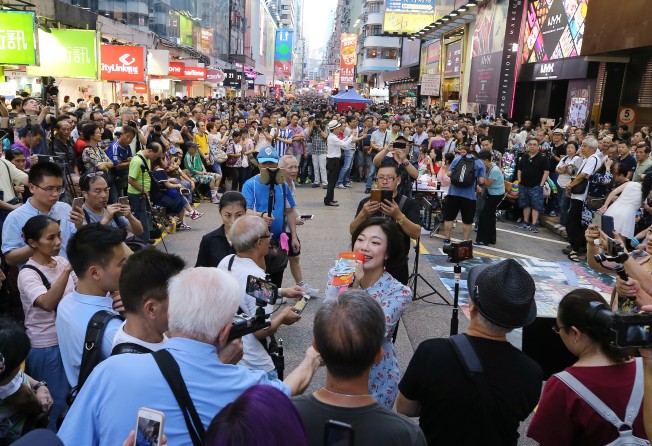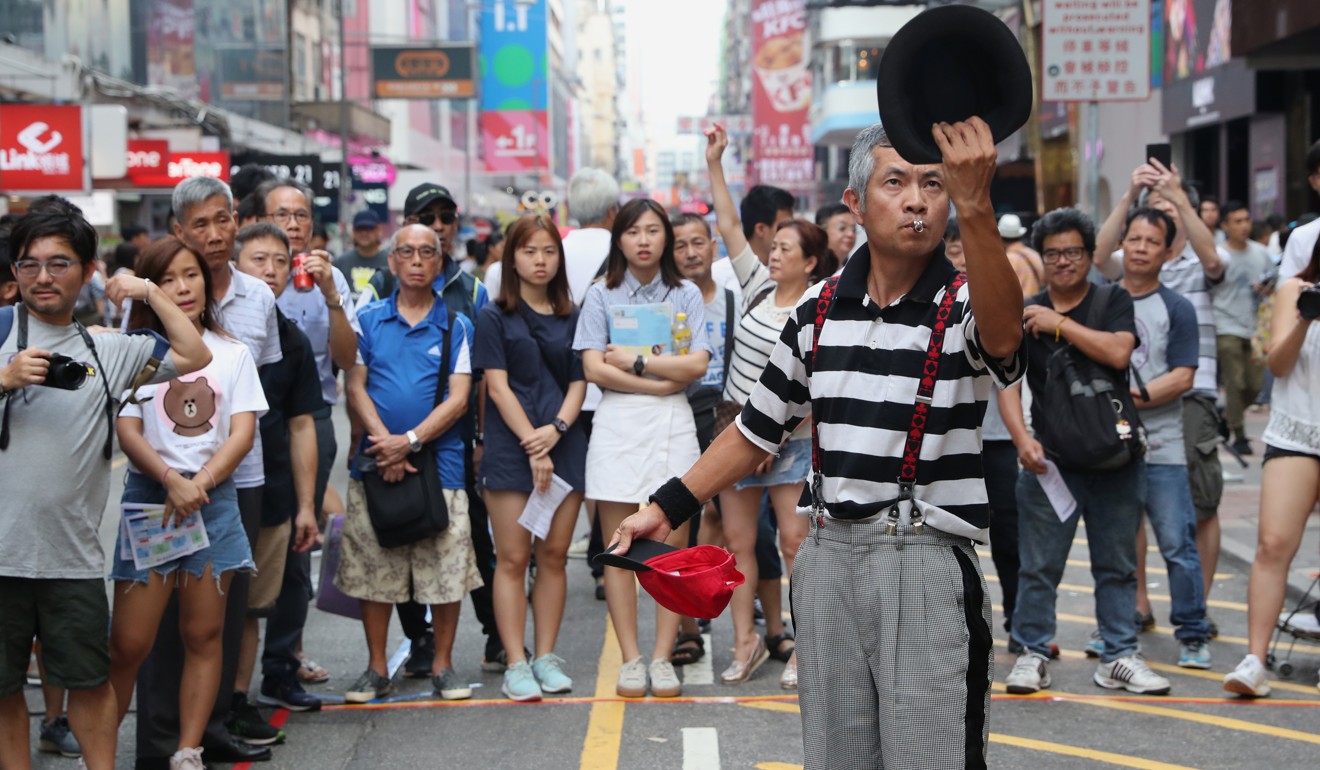Mong Kok street performers band together to call for licensing system in Hong Kong to revive lost culture
After years of competing for space and trying to outsing one another, artists who have lost their popular performing ground want better regulation and a compromise with authorities

Street performances in the heart of Hong Kong can be brought back to life if authorities introduce a licensing system and learn from other countries, buskers have said, a day after an iconic stretch in the city was closed to them for good amid noise concerns.
On Monday, performers lamented that the vibrant culture at the famous Mong Kok pedestrian zone – a 500-metre stretch of Sai Yeung Choi Street South – had changed over the years, leading to the shutdown. They said singers competed to see who was louder, compared with the past when there was a spirit of cooperation.
Ng Siu-fai, spokesman of an association of 22 Mong Kok performers and performing groups said his camp was drafting a proposal on licensing to the government. The group’s Chinese name translates into ‘Mong Kok Street Culture Association’.
Hong Kong currently does not have any permit framework in place to regulate street performances.
The association recommended having quotas for the number of performers in a certain area, with rules on noise levels. In a phone interview, Ng said the noise limits would be set according to the nature of the site, so there would be different conditions across areas.
“Such a mechanism would be beneficial to Hong Kong’s street performing culture,” he said.
The criteria to qualify for licences should be low so even amateurs could apply, Ng suggested, adding that the system could be adopted across the city, not just for gigs in Mong Kok.
He said it would be ideal if Sai Yeung Choi Street South was reopened for street performances because with its high pedestrian traffic, more people could be entertained.
The group intends to submit the proposal to the government by the end of August and seek a meeting with officials and district councillors.
Separately on a radio programme on Monday, Banky Yeung Ping-kei, artistic director of FM Theatre Power, sounded a similar call: “There can be a licensing mechanism, but it should not be too strict.
“One condition can be that the performers can’t be too loud … It’s hard to define whether the performers are professional or not. Should they be considered professional just because they are graduates of the Academy for Performing Arts? Not necessarily so.”
There can be a licensing mechanism, but it should not be too strict
Speaking on the same programme, Choy Chun-yu, a member of the art group called Let’s Start, proposed that a street performance association be set up.
“The performers need to become members of the association. They need to state what kind of acts they do. They need to fulfil certain criteria,” he said.
Another performer, Andrew So Chun-chau, also supported the idea. He said performers used to respect each other in the early years after the zone was opened to artists. Such respect was lost as more of them appeared in Mong Kok and competed for space, So added.
On Sunday evening, Hongkongers, tourists and buskers thronged the site for a last hurrah before police cleared the area and reopened it for motorists.
The singing and farewell speeches reached fever pitch as performers tried their best to outdo each other in a grand finale for fans, on a stretch that had captured the imagination of many for nearly two decades.
The zone was designated car-free from 4pm to 10pm on Saturdays, and from 12pm to 10pm on Sundays and public holidays. The hours were shortened several times between 2010 and 2014 following complaints about noise and overcrowdedness.
The Yau Tsim Mong district council in May passed a motion to terminate the zone, with its official closure to be implemented on Saturday, meaning performers would now have to take their weekend acts elsewhere.
Asked whether the government would consider a licensing system, a Home Affairs Bureau spokesman referred the Post to a bureau reply to the Yau Tsim Mong District Council in May.
In the reply, the bureau said the authorities have studied overseas registration or licensing regimes, which involve “complicated” issues.
“Given such, we should allow sufficient time for the society to discuss thoroughly and reach a consensus, so that street performances are supported by the community,” the bureau said.
In Melbourne, busking permits are required and applications can be submitted online or in person. The Melbourne city government issues four types of permits. The general area permits, for example, apply to buskers who do not use any dangerous props in their acts, and they can perform almost anywhere except in some restricted areas.

Once the application has been submitted, performers need to attend a session where they will be briefed on terms such as expected behaviour. Unless authorities need clarification, applicants will usually receive their permits on the day they attend the session.
An application fee of A$20 (HK$116) is required for a full-year permit, and A$10 for a three-month version.
Australian authorities have rules on sound levels. For example, they cannot be intrusive to the point that a passer-by would have to raise his or her voice to be heard. Upon receiving any such complaints, buskers must end their act immediately.
In London, the rules vary according to area.
The London Borough of Camden requires a busking licence if performers play music or use amplifiers. The financial district of the City of London, known as the Square Mile, allows street performances but artists cannot collect money for their acts. Busking is not allowed in some parks and squares.